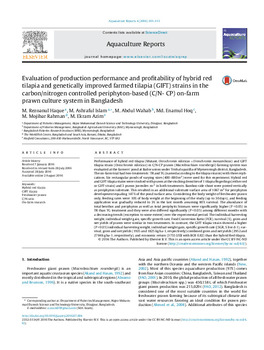Evaluation of production performance and profitability of hybrid red tilapia and genetically improved farmed tilapia (GIFT) strains in the carbon/nitrogen controlled periphyton-based (C/N- CP) on-farm prawn culture system in Bangladesh
Abstract
Bangladesh is one of the most suitable countries in the world for freshwater prawn farming because of its subtropical climate and vast water resources favoring an ideal condition for prawn production. Several recent developments of freshwater prawn farming have been found promising to improve the productivity and sustainability of pond aquaculture production. (1) control of C/N ratio (2) development of periphyton using substrates (3) fish driven re-suspension and (4) combination of C:N ratio, periphyton substrates and fish driven approaches in freshwater ponds. These approaches are simple and cheap even for small-scale or poor farmers. Considering freshwater prawn as a key species, the combination of these approaches raised pond productivity by efficient nutrient utilization above levels obtained through applying each of these techniques independently which further enhanced environmental and economical sustainability. This combined technology has been referred to as C/N Controlled Periphyton-based (C/N-CP) system. In the recent years, the introduction of GIFT tilapia has added a new era for tilapia farming in Bangladesh. Its performance was found to be significantly superior to that of other tilapias in many respects Interest on polyculture of freshwater prawn with fish, especially tilapia, has been growing during last few years. The present experiment was undertaken to compare the relative production performance and profitability between red tilapia hybrid and GIFT strain of Nile tilapia in previously tested Carbon/Nitrogen controlled periphyton-based freshwater prawn system in farmers' ponds

